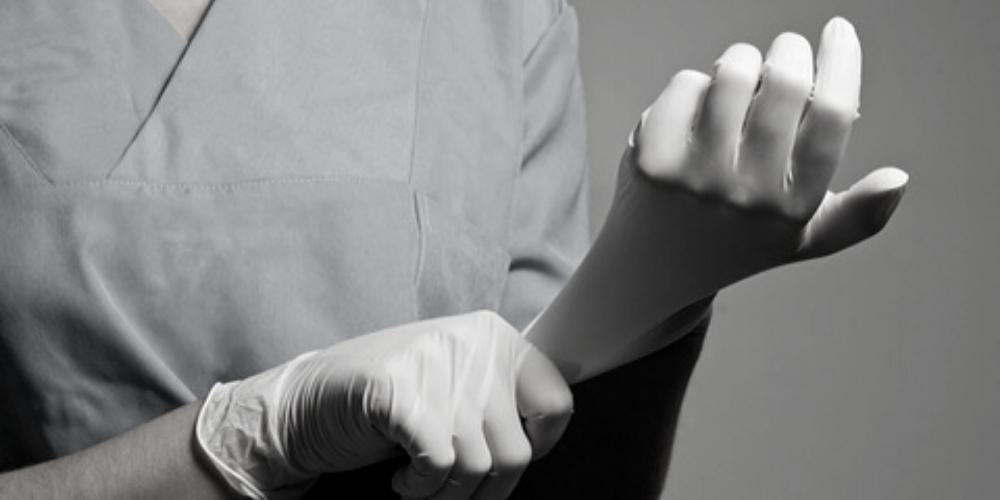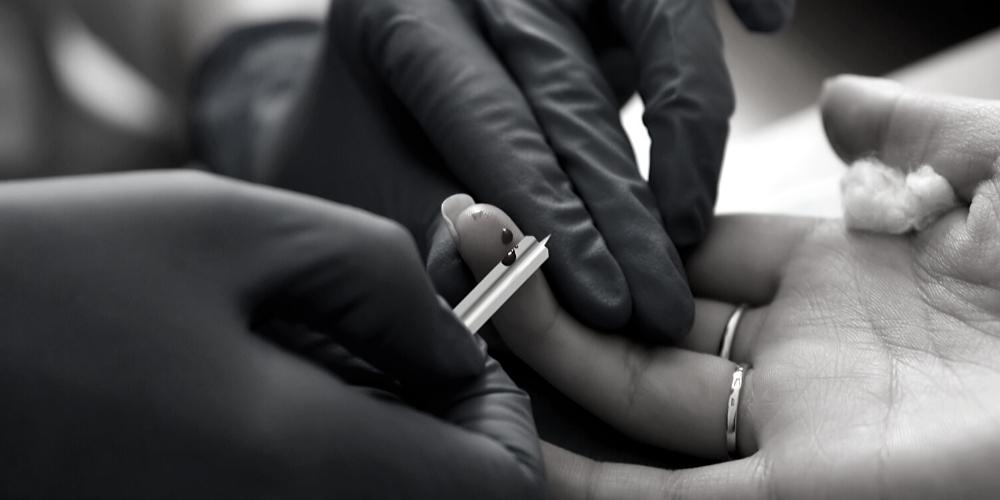When it comes to selecting gloves for commercial and professional use, the choices are almost limitless. Examination gloves, in particular, can pose several challenges as far as deciding on the right variety.
Whether the gloves are latex-free is an increasingly important factor for workers using exam gloves, such as those in healthcare fields. However, this is only part of the equation. Here, we take a closer look at whether nitrile exam gloves are latex-free, as well as some of the most important factors to keep in mind when choosing an examination, or ‘medical grade’, glove.
What are nitrile exam gloves?
Disposable examination gloves, or ‘medical grade gloves’ are typically used by those working in the medical, healthcare and hygiene fields, as well as by some laboratory workers. Unlike surgical gloves, exam gloves are used for examining patients and materials only, and not intended for use alongside surgical equipment. Their primary role is to prevent cross-contamination between patients and healthcare workers, and potentially harmful or contaminated materials. For this reason, they must be disposed of after coming into contact with each patient or each hazardous or infectious material.

Nitrile exam gloves are made from synthetic rubber, unlike natural rubber latex gloves. The nitrile material benefits from resistance to oil and a range of chemicals, is tear-resistant, and has a high level of puncture resistance. Given their superiority to latex gloves and particularly vinyl gloves in terms of durability, these disposable gloves are becoming an increasingly popular choice for the medical and healthcare fields. However, many organisations are still choosing to use latex gloves. Below, we uncover just how problematic this can be.
Why choose latex-free gloves?
Historically, latex gloves have been used as examination gloves for those working in medical roles and in hygiene fields such as dentistry. Latex has been a preferred choice for many workers in these areas due to the flexibility and sensitivity offered by these types of gloves.
Seeing as latex gloves offer a good value and extremely touch-sensitive solution, why should they be avoided in certain fields? The answer to this is two-fold. Firstly, latex gloves, although offering a high degree of sensitivity, are also prone to puncturing and are generally less resistant to oil-based chemicals and solvents. Latex-free nitrile gloves can offer improved resistance to oil-based chemicals, and offer a greater degree of durability, particularly in terms of punctures.
The second major reason that latex gloves should be avoided in certain fields is the issue of latex allergies. According to studies by Harvard Health, up to 6% of the population suffers from a latex allergy. HSE (Health and Safety Executive) lists potential symptoms of latex allergies as ranging from skin redness, rash, hives or itching to difficulty breathing and wheezing. In rare cases, anaphylactic shock and even death can occur. For healthcare and medical professionals, in particular, this is a serious issue. Not only may users themselves suffer from a latex allergy, but so too the patients and clients they come into contact with.
Using latex gloves means putting patients at risk and is a danger that can be easily avoided by switching to nitrile exam gloves. HSE recommends that adequate risk assessment be completed by all workplaces considering the use of latex gloves and, where there is deemed to be a significant risk of latex-related health concerns, the use of these gloves should be avoided.

Nitrile gloves offer workers a latex-free and robust safety glove solution. Despite this, many industries have avoided the use of nitrile gloves, as they were once quite inflexible and restricted the ability of users to make examinations on patients.
In recent years, however, tremendous advances have been made in the manufacturing of nitrile gloves, making them more user-friendly and suited to a wide range of tasks. In order to address the comfort and sensitivity benefits of latex gloves, modern manufacturing techniques have seen the introduction of ultra-lightweight versions of nitrile gloves to the market.
What’s more, the durability of nitrile gloves means reducing the need for regular replacement due to tearing and puncturing – offering organisations a more long-term, cost-effective solution to latex gloves.

Are nitrile exam gloves latex-free?
Nitrile gloves are made from synthetic rubber that does not contain latex and is, therefore, safe for contact with people suffering from a latex allergy. These types of gloves have traditionally been less flexible than latex gloves and offered less sensitivity for the fingers and hands. However, due to advances in the manufacturing of nitrile exam gloves, they have become much thinner, more flexible, and suitable for use in healthcare and related fields. Nitrile exam gloves also come in static-free and powder-free varieties (glove powder can potentially contaminate working surfaces and testing, or interfere with wound healing), making them suitable for a variety of uses.

The important advantage of nitrile exam gloves over latex gloves lies not only in the absence of latex but in their robustness. Although nitrile gloves have become thinner and more flexible in recent years, they still offer a high level of resistance to many chemicals, as well as protection against punctures and tearing. This is particularly important for those working in the healthcare and medical sectors, where durability is equally, if not more important, than sensitivity.
Unigloves nitrile exam gloves
As a leading supplier of disposable gloves, Unigloves has spent over 30 years developing and manufacturing high-quality, industry-specific examination gloves for the healthcare, hygiene and medical sectors. Our mission is to make homes and workplaces safer, stop the spread of disease, and protect people against risks they may encounter in the workplace. This is why we continue to work closely with our partners in both PPE (personal protective equipment) and medical distribution to ensure that our end-users are provided with the best possible protection, no matter the risks they face.
Our medical grade nitrile examination gloves are rigorously tested to the AQL (acceptable quality limits) standards for medical gloves and are suitable for use in all fields where biological hazards (such as exposure to microorganisms including viruses, fungi, and bacteria, or cell cultures, internal or external parasites) are a factor. We understand that the safety of workers and of the public are of utmost importance, which is why - from infection control to hand hygiene and user comfort – our nitrile exam gloves are designed to make workplaces safer for everyone.
Browse our product catalogue for the full range of medical grade nitrile exam gloves, or contact us to find your nearest Unigloves stockist.


